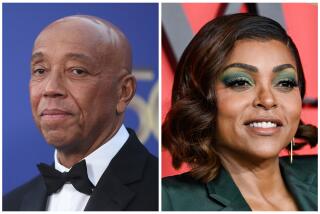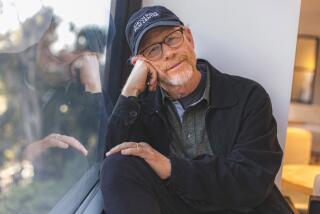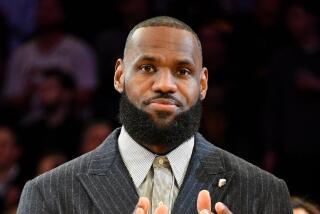Jim Henson’s Children Put Together a String of Big Deals to Keep Alive : The Muppet Legacy
- Share via
The simple message sat framed atop Jim Henson’s office fireplace--words from an admirer who shared one of his gifts. “Dear Jim,” wrote Edgar Bergen over a black-and-white photograph of himself and the inanimate Charlie McCarthy, “Keep the magic alive.”
Like Bergen, Henson could bring life to mere objects. Sesame Street, the Muppets, Kermit the Frog--they were only a few examples of his contributions. But without Henson, can the magic live on at his company?
Twenty-six months after his unexpected death, Henson’s successors are talking and acting ambitiously: They have cut deals with major corporate partners to mass market an array of new and existing Henson products--from feature films to children’s playwear.
“It’s not one man’s vision” any longer, said 28-year-old Brian Henson, who, with a younger brother and three sisters, inherited the company. “We are a company with a creative team at the top. My father built a company around him; I’m spreading that.”
As part of its expansion, Jim Henson Productions Inc. is making two half-hour shows for network television and a feature-length movie. “The Muppet Christmas Carol,” directed by Brian, who also is the company’s new president, will appear in theaters in December. And Henson Productions recently entered a deal with Wal-Mart for the exclusive retailing of Muppet clothing.
“Brian has done a phenomenal job in picking up the torch and running with it,” said Jeffrey Katzenberg, chairman of Walt Disney Studios, which will distribute “Muppet Christmas.” “He’s done it not only in continuing on with the existing (assets)--but most impressively, (the company is) incredibly productive right now” with new projects.
Said Charlie Rivkin, Henson Productions’ 30-year-old chief operating officer: “This is a classic example of converting an entrepreneurial, family run business to a professionally run business. . . . The long-term objective of this company is to become the premier provider of family entertainment programming to the world marketplace.”
The company, valued in excess of $100 million before Jim Henson’s death, is in the enviable position of carrying no debt, Rivkin said. Neither Rivkin nor Brian Henson would rule out the possibility of a public stock offering.
“We’re flattered by the number of (investment bankers) who have been approaching us,” Rivkin said, declining to describe in any way the company’s annual revenue or cash flow.
To those who might chafe at the notion of Kermit cruising Wall Street, consider the company’s outlook just two years ago: When Jim Henson died on May 16, 1990, at New York Hospital, it could also have meant the demise of his company.
Henson’s death, of a massive bacterial infection, came suddenly, at age 53, and at a point when his enterprise was about to undergo a drastic transformation.
The company that made learning fun for a generation, the company whose characters could speak with a worldliness also appreciated by adults, the company whose culture was decidedly un- bottom line, was about to merge with Disney--a business-entertainment colossus.
Henson Productions and Disney Co. Chairman Michael D. Eisner had agreed with a handshake--Disney would acquire all of the company’s assets, except for Sesame Street. The complex arrangement called for Henson Productions to receive $100 million to $150 million in cash and stock--and the freedom to focus on new creative projects under the Disney tent.
But by December, 1990, the handshake deal had crumbled amid acrimony. Five months later, Henson’s five children sued, alleging trademark infringments. They accused Disney of “corporate greed” and “‘extreme arrogance.” Disney countersued, its spokesman parrying at one point: “There are tears in Mickey’s eyes today.”
Both sides soon dropped their lawsuits. Yet at Henson Productions, the future remained clouded.
Because of the pending merger and the shifting of its headquarters from New York to Hollywood, the company had delayed developing new projects for about 18 months. In addition, the five Henson children had to weigh any potential sale against the still-pending imposition of estate taxes that will drain roughly 55% of the value of their inheritance. And there was the loss of Jim Henson’s immeasurable creativity.
His father’s death and the failing of the Disney merger, said Brian Henson, “could have been the end of our company.”
Yet it was Brian who, by early 1991, was chosen by his brother and sisters to become president, chief executive and chairman. The company is wholly owned by the Henson children. A daughter, Cheryl Henson, is a board member and the company’s liaison to the Children’s Television Workshop, the nonprofit group in New York that still produces “Sesame Street.” Another daughter, Lisa Henson, also sits on the board. Jim Henson was separated from his wife, Jane, for five years before his death; she holds no stake in the company.
Like all of the Henson children, Brian grew up in suburban Bedford, N.Y., watching firsthand the development of Miss Piggy, Fozzy Bear and the other Henson characters.
“My father was a real family man,” Brian said, “so we were always on the sets, playing around the boxes full of eyeballs and stuff like that.”
Perhaps more importantly, Brian became well-steeped in puppetry, the seminal craft of the family business. He watched “Jim,” as he occasionally refers to him, pioneer the art of puppeteering within a frame, for television. At 17, Brian took a big step into his own future, handling marionettes under his father’s direction in the film “The Great Muppet Caper.”
Various directing jobs outside the company followed--along with growing involvement in the computer-assisted, technological advances in puppetry first seen in “Teenage Mutant Ninja Turtles,” a film that the Hensons helped make.
Still, when leadership of his father’s company fell to him, Brian Henson did not fit the conventional profile of a CEO. He was 27 years old. He had one year of college education. He had no experience at running any company.
“There was some uncertainty, I think quite understandably, when Brian took over,” said David Barrington Holt, who supervises the company’s co-production of “Dinosaurs,” a sassy, high-tech comedy that airs on ABC. “(Brian) suddenly had to pick up the company and it had to be a hell of a burden for him, in all sorts of ways. . . . I think very wisely, very rightly, he chose to become his own person.”
And as Brian Henson acknowledges, he is leading with the backing of essentially the same creative team assembled by his father. The staff includes Executive Vice President Michael K. Frith, the company’s 50-year-old puppet designer in New York, and, in London, Frank Oz, a director and producer Jim Henson is said to have called “the best puppeteer in the world.” Oz also is a member of the Henson Productions board.
Rivkin said the company now employs 135 people--25 at Hollywood headquarters on Melrose Avenue; 85 in New York, home of the Muppet Workshop; and 25 in London, where the Creature Shop designs and constructs the computer-assisted beings.
And guess which company is proving to be Henson Production’s primary partner?
“Disney has remarkably changed its attitude,” Brian Henson said in an interview. “Right now, I’d say we’re working very well together. We recognize each other’s talents. If anything, we’re more sensitive to each other than we’ve ever been. . . . Business-wise, it’s a terrific relationship. Corporately, there’s quite a culture gap between our two companies.”
Although not involved directly in the companies’ merger negotiations, Disney’s Katzenberg saw the relationship root, collapse and mend.
“Clearly, we had a marriage that kind of fell apart at the altar,” Katzenberg said. But he added that after both companies rethought the benefits of sharing their strengths, renewing the relationship made sense.
“We started dating again. We’re going steady. There’s an enormous amount of good work going on between the companies. . . . We (at Disney) always wanted to be together (with Henson). We believe in them--creatively, for the future, and in the value of their past, their library” of existing television and film product.
The relationship now encompasses a wide swath of the companies’ businesses:
* Theme parks: Disney paid a license fee of about $10 million for exclusive domestic rights to Henson attractions at parks east of the Mississippi River through May of 1994. Disney also will also retain the rights for another two years, non-exclusively. In Orlando, Fla., Disney hosts two Henson-related attractions: “Kermit the Frog Presents Muppet Vision 3-D,” and a musical revue, “Here Come the Muppets.” Muppet memorabilia also is sold at one store in the park.
* Home video: Disney’s Buena Vista subsidiary has licensed, for an undisclosed price, the worldwide rights to distribute Henson Productions’ existing 300 hours of TV and film programming for five years. In addition, Buena Vista could finance “up to” three new projects specifically for home video.
* Cable TV distribution: The Disney Channel has exclusive rights to distribute certain TV and film programming from Henson Productions library through 1997. Included are “The Muppet Movie,” “The Great Muppet Caper” and “The Dark Crystal.”
Disney’s Buena Vista International also has rights through 1997 to distribute abroad all of Henson Productions’ pre-existing TV programming in free broadcast, cable or pay-per-view markets.
* Other TV and film production: Disney Studios will distribute in theaters the Brian Henson-directed “Muppet Christmas Carol” being filmed outside London. (The film will mark the comeback of Kermit--whose puppeteer and voice was Jim Henson). Disney also co-produces “Dinosaurs.”
According to Rivkin, only the theme park deal came as a byproduct of the resolution of the 1991 litigation with Disney. “Dinosaurs,” he confirmed, began as Jim Henson’s idea and was developed with Disney in the months immediately following his death.
“It just so happens that Disney is the best (partner) in a number of areas,” Rivkin said. He also stressed that all Henson Productions’ TV and film assets will revert to the company when the distribution licenses lapse.
From programming to playwear, Rivkin noted that Henson Productions is teaming with major partners other than Disney:
* Henson Productions also is collaborating on “Dog City,” a show combining live action and animation scheduled to debut this fall on the Fox network.
* Within weeks, the company is to announce the creation of a Muppet music label with what Rivkin described as a “major” distributor. The label will feature the soundtrack of “The Muppet Christmas Carol,” and will draw from older material, including original unreleased Jim Henson recordings.
* The company also has deals involving at least two additional feature movies with other major studios, according to Alex Rockwell, 29, Henson Productions’ senior vice president of creative affairs. It is to co-produce with Francis Ford Coppola a live-action version of the 1940 Disney classic, “Pinocchio,” for Warner Bros., where Brian Henson’s 32-year-old sister, Lisa, is a top production executive. Henson Productions also is committed to co-produce another film, “Into the Woods,” to be distributed by Columbia Pictures.
“When it comes to studios, I’m trying to know every one of them,” said Brian Henson.
Rivkin, hired out of Harvard Business school by Jim Henson in 1988 and promoted last year to chief operating officer, describes a company transformed. Gone, he said, are the days of “very rudimentary” budgeting and business planning.
“I think Brian realizes that we have an incredibly powerful business and that it can be run efficiently. . . . I don’t want to insult the past--because the past is what we’re growing from. We’re able to take the under-exploited assets and make them a lot stronger. . . . (By) the end of the year, the Muppets are going to be all over the airwaves, in all media. I think we’re witnessing a resurgence, or even a renaissance, of the Muppet franchise.”
But will the stepped-up, worldwide marketing of the Muppet characters diminish them? Can Henson remain Henson when it teams with Hollywood’s top commercial studios? Can the magic be kept alive?
The answers may depend on how independent Henson Productions can remain.
“Will the Henson family have that total control, or is it going to be diluted to please other people?” asked Ward Kimball, one of Walt Disney’s original “Nine Old Men” of top animators who saw that company sputter creatively after Disney’s death in 1966.
Said Lisa Henson: “I think that the people who work in the company have a very clear sense, when they consider a project, whether it is” consistent with Henson Productions’ traditional standards. She defined the basic company ideal as “some combination of friendliness and irreverence and humor.”
In the view of Frith, the puppet maker who first collaborated with Jim Henson in 1975: “We lost a vital and exciting and terribly talented person. But at the same time, the path still seems quite clear. . . . I find that Brian is clearer and even stricter on some of these things than even Jim was.”
Sitting on a couch at the Hollywood offices, not far from a picture of himself with the father who remains a legend, Brian Henson weighs the unavoidable: What would Jim think?
“Every decision you make, you have to be careful,” he said. “I have to hope and assume that he would be very happy with what we’re doing--because that’s something I have to consider when I do anything.”
More to Read
The biggest entertainment stories
Get our big stories about Hollywood, film, television, music, arts, culture and more right in your inbox as soon as they publish.
You may occasionally receive promotional content from the Los Angeles Times.











